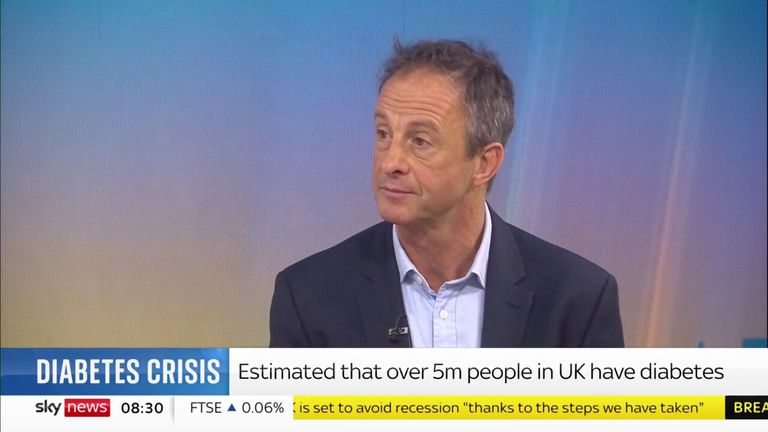Diabetes: Thousands of new cases could be diagnosed from screenings in A&E, study suggests
According to data, around 850,000 people have diabetes but are yet to be diagnosed. Over time, failure to diagnose the condition can lead to complications such as heart disease, nerve damage and retinopathy.
Wednesday 4 October 2023 02:32, UK
Diabetes screenings done in A&E could pick up thousands of undiagnosed cases, new research has suggested.
During the study, 1,388 patients were screened for type 2 diabetes while attending the A&E department at Tameside and Glossop Integrated Care NHS Foundation Trust in Ashton-under-Lyne.
Results showed that 848 (61%) had normal blood glucose levels, but 420 (30%) were found to have pre-diabetes and 120 (9%) were diagnosed with type 2 diabetes.
They were screened using the glycated haemoglobin (HbA1c) test, which gives an indication of average blood sugar levels over the previous two to three months.
They were also asked to complete a questionnaire about their background, ethnicity and risk factors for diabetes such as being overweight or obese.
Each patient was then given a Finnish Diabetes Risk Score - with scores higher than 20 indicating a very high risk of developing diabetes and scores of 12 to 20 indicating moderate to high risk.
Based on the results, experts said tens of thousands of new cases of type 2 diabetes and pre-diabetes - a serious condition where blood sugar levels are higher than normal but not high enough to be diagnosed as type 2 - could be diagnosed in A&E departments across the country every year.
It comes after data from charity Diabetes UK predicted more than 4.3 million people in the UK have diabetes, with 850,000 yet to be diagnosed.
Be the first to get Breaking News
Install the Sky News app for free


Read more:
Aspirin could help cut diabetes risk in over-65s
Being lonely may increase risk of heart disease in diabetics
Professor Edward Jude, from the Tameside Hospital NHS Foundation Trust, who worked on the study, said: "Early diagnosis is the best way to avoid the devastating complications of type 2 diabetes, and offers the best chance of living a long and healthy life."
He said type 2 diabetes can be tricky to stop, and can lay undetected for up to 10 years, leading to "long-term complications such as heart disease, nerve damage and retinopathy".
'Remarkable' new treatment for type 1 diabetes
Where type 2 diabetes is linked to the insulin the body produces not being able to work effectively, individuals with type 1 diabetes make little or no insulin at all.
Yet, researchers have found that three patients managed to achieve "insulin independence" after using a new stem cell-derived treatment called VX-880.
The treatment works by restoring function in certain cells in regions of the pancreas that produce hormones, which in turn helps the body regulate blood sugar levels.
The results were dubbed as "truly remarkable" by Professor Trevor Reichman from Toronto General Hospital in Canada, who presented the study.
"It offers hope of a life-changing therapy for people who suffer from the relentless life-long burden of type 1 diabetes," he said.

